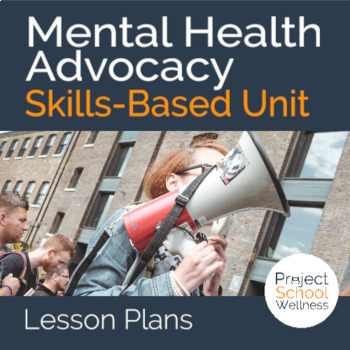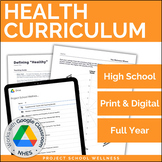Mental Health Advocacy a Skills-Based Health Education Project
- PDF
- Google Apps™

Also included in
- In these mental health unit plans and mental health awareness activites, students will learn how to navigate and take control of their mental health. Students will examine the difference between mental health and mental health disorders. They will utilize the visual of the Mental Health Bucket to anPrice $45.00Original Price $80.00Save $35.00
- Immerse your high school students in a transformative health and wellness journey with our comprehensive, skills-based health curriculum. Designed as a fully prepared, done-for-you program, this high school health and wellness curriculum focuses on cultivating core health skills that seamlessly intePrice $525.00Original Price $776.50Save $251.50
Description
In this Mental Health and Mental Illness Advocacy resource, students will create a compelling and relevant advocacy message, understand how to boost Mental Health, and access Mental Illness care not only for themselves but for their family and community as well.
This product contains eight separate lessons that use a skills-based approach. Students will learn the functional knowledge of the health skill as well as developing the proficiency to use the skill. Each lesson contains everything you need to teach this important skill, including Powerpoints, links to videos, and any needed printable materials.
Lessons Included:
- Lesson 1: What is Advocacy?
- Lesson 2: Advocacy in Real Life
- Lesson 3: How to Be An Advocate
- Lesson 4: Understanding Mental Health
- Lesson 5: Boosting Mental Health
- Lesson 6: Accessing Mental Illness Care
- Lesson 7: Mental Well-Being Advocacy Message
- Lesson 8: Share, Assess, and Reflect
Why You’ll Love It:
- Ready-to-Teach - This resource comes with everything you need to teach an engaging lesson: teaching guide, teaching PowerPoint, answer key, grading rubric, discussion protocol, exit task, and more
- Skills-Based Approach - This resource teaches students vital knowledge and skills they need to take ownership of their well-being.
- Standard Aligned - This resource was designed in connection to the National Health Education Standards.
- FREE updates for life - Get access to this product and any future updates with your one-time purchase.
National Health Education Standards:
- NHES #3: Students will demonstrate the ability to access valid information, products, and services to enhance health.
- NHES #7: Students will demonstrate the ability to practice health-enhancing behaviors and avoid or reduce health risks.
- NHES #8: Students will demonstrate the ability to advocate for personal, family, and community health.
Distance Learning Compatible
This resource is hosted on Google Drive, featuring Google Slides edition of student worksheets and can be used with Google Classroom. - - Want to learn how to use Project School Wellness resources in your distance learning classroom? Learn how on our blog!
When you download, you’ll receive a full 8 full lesson plans with everything you need to teach the lesson, from the beginning of class to the end:
- Instruction Video - Just for teachers, outlining how to teach the lesson
- Teaching Guide - A detailed lesson plan
- Teaching Powerpoints
- Student Worksheets - They come as PDFs and Google Slides
- Grading Rubrics and Answer Keys - For quick and meaningful assessments
- Free updates for life!
Free Lesson Plans - Download Now!
- Download our Intro to Health bundle for free! Use this bundle to introduce students to health. Students will learn about the dimensions of health, explore the Wellness Wheel, identify what their best life looks like, and practice building healthy habits.
Free Skills-Based Health Workshop - Sign Up Here!
- A free teacher training workshop to help you discover what skills-based health education is, why it matters, and how to integrate this approach into your classroom. This self-paced workshop will help you become a teacher that not only helps students understand important health concepts but one that actually transforms how students live their daily lives.
We provide teachers with engaging skills-based health lesson plans focused on relevant issues. Helping you equip students with the knowledge and skills to take ownership of their well-being and thrive. Our lessons are:
- Skills-Based Approach - Check out our free skills-based health education workshop!
- Aligned to National Health Education Standards
- Fully Designed Plans - This means no extra planning and minimal prep!
- Comprehensive Focus - Empowering your students to live full and thriving lives!
If you like this resource, you might also like these related products:
- Analyzing Influences on Mental Health
- How to Write Goals with SMART Goal lesson plan and Classroom Posters
- Dealing With Challenges and Coping Mechanisms
- Mental Health and Emotions Skills-Based Lesson Plan
- Social-Emotional Learning and Mental Health Skills-Based Bundle
- Interpersonal Communication Skills and Conflict Resolution
- Stress and How to Manage It with Stress Management Stations
- Analyzing Health Influences
- How to Make Healthy Decisions and the D.E.C.I.D.E. Model
Google Drive Disclaimer
Upon purchase, you’ll receive a link to access your resource on Google Drive. Using Google Drive is the easiest way for us to edit and update resources. This allows us to quickly respond to feedback, share new features, and make sure this product is serving you well!







